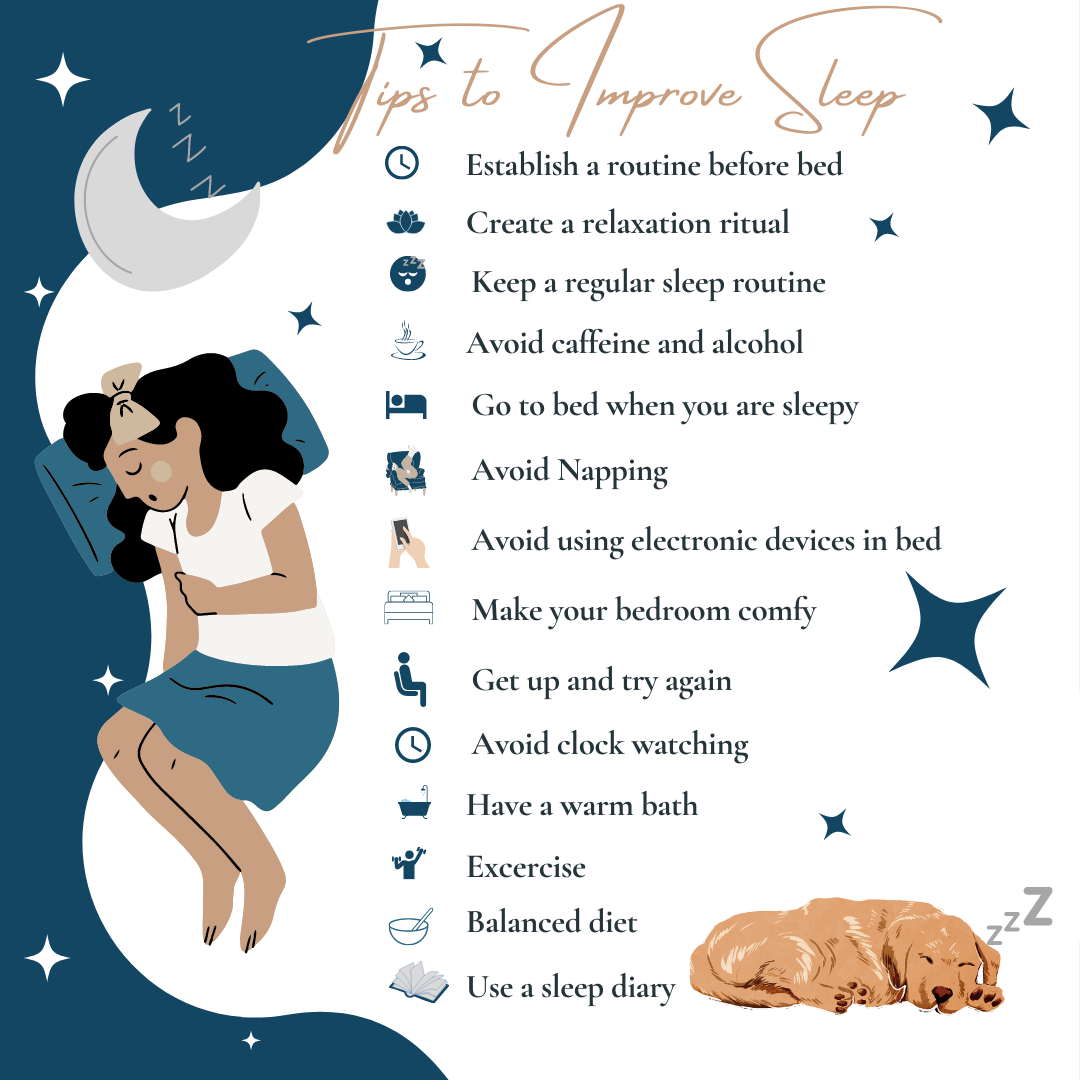Sleep deprivation is a common problem that can have negative consequences on your health, work, and personal life. According to a 2019 report by the Sleep Health Foundation found almost 60 percent of Australians regularly experience at least one sleep symptom and 14.8 percent have symptoms which could result in a diagnosis of clinical insomnia.
The lack of sleep can lead to problems such as decreased productivity at work, car accidents, and weight gain. Poor sleep can also increase your risk for chronic diseases such as heart disease and diabetes. Sleep affects pain and mood. Studies have shown that poor sleep increases pain levels and the likelihood of developing mood disorders, such as anxiety and depression.
Sleep Hygiene is a term used to describe good sleep habits. By developing good sleep habits, we can make a positive impact on the quality of our sleep. There are a few simple things you can do to improve your sleep habits. Follow these tips and you will be able to get a better night’s rest, which will help you feel refreshed and energetic the next day.
- Establish a routine before bed
Are you one of those people that cannot seem to fall asleep unless everything is just perfect? If so, you are not alone. A lot of people have trouble falling asleep because they wait until the last minute to try and relax. This often leads to a restless night’s sleep.
One of the best ways to ensure a good night’s sleep is to establish a routine before bed. This could include reading, taking a bath, or listening to calming music. By doing the same things each night before bed, your body will know that it is time for sleep.
- Create a relaxation ritual
In today’s world, it seems like there is always something happening that requires our attention. From work deadlines to family obligations, it can feel like we are constantly on the go. This non-stop lifestyle can be taxing both mentally and emotionally, leading to feelings of stress and anxiety. One way to combat these negative emotions is by creating a relaxation ritual. A relaxation ritual can be anything from taking a hot bath to meditating for 10 minutes each day. By incorporating a relaxation ritual into your daily routine, you can take some time for yourself to decompress and relax. Not only will this help you feel better mentally and emotionally, but it can also improve your sleep and overall health.
- Keep a regular sleep routine
One way to ensure you are getting enough sleep is to keep a regular sleep routine. This means going to bed and waking up at the same time each day, even on weekends. It may be hard to adjust to at first, but after a few weeks your body will get used to the new schedule and you will start feeling more rested.
- Avoid caffeine and alcohol before bed
The National Sleep Foundation warns people that caffeine and alcohol can both disrupt sleep. Caffeine is a stimulant and can keep you awake, while alcohol makes it harder to stay asleep and can lead to disrupted sleep patterns. If you are looking for a good night’s sleep, avoid caffeine and alcohol before bed. Avoid alcohol four to six hours before going to bed as it can interrupt the quality of your sleep.
- Go to bed when you are sleepy
Only go to bed when you are tired or sleepy to avoid lying in bed awake tossing and turning. Not being able to fall asleep can be frustrating thus keeping you awake longer.
- Avoid Napping
Avoid napping during the day as it can also cause problems with sleeping at night. If you must nap, take a short nap mid – morning or early afternoon (before 3 pm) for less than an hour.
- Avoid using electronic devices in bed
Electronic devices like your phone emit blue light, which can reduce the melatonin levels in your body. So, keep screen use to a minimum, at least one hour before going to bed.
- Make your bedroom comfortable
The bedroom is an important place for sleep. It should be dark, quiet, and comfortable. A cool room is best for sleep. Keep the room temperature around 18 degrees. Use light blankets in the summer and heavy blankets in the winter. The bed should be comfortable with a good mattress and pillows. Ensure you reserve your bedroom for sleep only so that your body associates your bed with sleep.
- Get up and try again
If you wake up during the night or cannot get to sleep after about 20 minutes or so, get up and do something else calming or boring until you feel sleepy again.
- Avoid clock-watching
Often when people struggle to sleep, they tend to watch the clock making it more difficult to fall asleep. Frequently checking the clock can increase our anxiety about not sleeping. It may be worth removing the clock from your bedroom.
- Warm bath
Having a hot bath, a couple of hours before bedtime can be useful, as it will raise your body temperature, causing you to feel sleepy as your body temperature drops again. Research shows that sleepiness is associated with a drop in body temperature.
- Exercise
Regular aerobic exercise for 30 minutes a day can help improve your sleep and overall health. Avoid strenuous exercise two to four hours before bedtime as it can increase your energy levels and body temperature making it hard to fall asleep.
- Balanced diet
A healthy, well-balanced diet will promote good sleep. Avoid heavy, fatty, and sugary foods before going to sleep. Wait at least three hours after you have eaten to go to bed. A warm glass of milk, which contains tryptophan, may help induce sleep.
- Use a sleep diary
A sleep diary can be a useful way of monitoring our sleep patterns. A review of your sleep diary can help you identify any patterns or practices that are helping or hindering your sleep so you can implement changes to help improve your sleep hygiene.
Sleep is essential for optimal health and well-being. Improving sleep can have a significant impact on overall well-being. Small changes can make a significant difference towards better sleep, so it is important to take some time to investigate strategies that work best for you.
If your sleep difficulties do not improve through good sleep hygiene, you may want to consult your physician or a sleep specialist.


